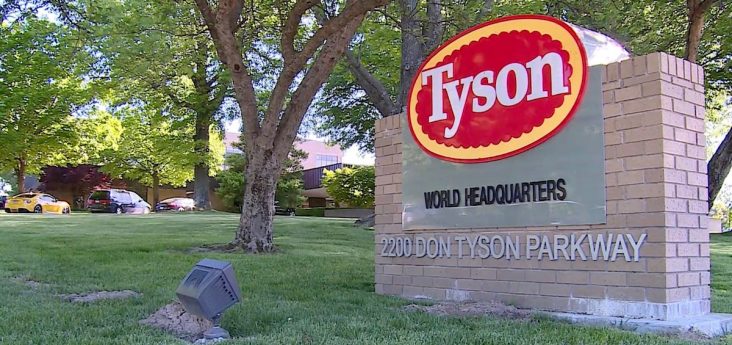Tyson Foods top six execs earn a combined $38.524 million in 2019
by December 20, 2019 2:40 pm 3,226 views

Tyson Foods’ c-suite ran a profitable business in fiscal 2019 and were rewarded with pay raises ranging from 1.5% to 34% in base salaries, according to the company’s annual proxy filing with the Securities and Exchange Commission on Friday (Dec. 20).
CEO Noel White’s total compensation was $10.398 million, up 81% from the prior year. White was promoted to CEO in late 2018. His base salary in 2019 was $1.156 million, up 34% from the prior year. His stock awards totaled $4.451 million with option awards of $1.375 million. He received non-equity compensation of $1.368 and pension benefits of $1.458 million. The other compensation reported to the SEC totaled $588,945, which included $114,252 in tax reimbursements, $177,674 in contributions to his executive savings plan and $196,170 for the personal use of company-owned aircraft and for event tickets.
Tyson Foods Board Chairman John Tyson received compensation of $10.322 million, which included a base salary of $1.062 million, up 1.5% year-over-year. His stock awards, option awards, non-equity compensation benefits totaled $7.393 million. His other compensation totaled $1.83 million consisting mainly of tax reimbursements and $1.393 million for the personal use of the company-owned aircraft and amounts for event tickets and insurance premiums.
Stewart Glendinning, chief financial officer, had a base salary of $777,395 for the year, up from $581,096 in the prior year. His salary structure in 2018 also included a $2.7 million bonus he did not get in 2019. Glendinning earned a combined $2.682 million in stock, option and non-equity compensation in 2019. His deferred pension earnings and other compensation added $281,895 to his bottom line. His total earnings for 2019 were $3.732 million, down from $7.588 million in 2018 that included one-year hiring incentives.
Sally Grimes, the only female in the top six earners at Tyson Foods, announced her departure effective Dec. 31. For most of 2019, she served as group president of the prepared foods segment and received compensation of $4.14 million. Her base salary was $848,539 up from $786.231 in the prior year. Stock, option and non-equity compensation totaled $2.9 million. Her deferred compensation benefit totaled $226,334 and other compensation was $154,687, most of which was for executive saving plan contributions.
Donnie King, group president for Tyson’s growing international segment, came out of retirement in 2019. His base salary was $577,154 and he received bonus pay of $387,550 with stock, option and non-equity compensation tacking on another $4.884 million. King’s other compensation was $408,844, which included severance pay of $303,476 and $44,000 in personal use of the company-owned aircraft.
Scott Spradley, chief technology officer, made the top-earning list for the first time in 2019. His base salary totaled $578,500 and he received a sign-on bonus of $1.1 million. His stock, option and non-equity compensation awards totaled $366,132 with another $133.495 added for deferred compensation awards. His other compensation added $118,580 to the total. That included a $70,308 contribution to the executive savings plan and another $8,802 for the personal use of the company-owned aircraft. Spradley’s total compensation in 2019 was $3.673 million.
Tyson Foods was one of the most favored stocks to own in 2020, according to Bank of America analysts. Tyson Foods (NYSE: TSN) ranked among Disney, ExxonMobil, Intel, American Electric Power and Citibank by Bank of America analysts who picked one company in 11 business sectors they recommend owning in 2020. Since Jan. 3, shares have risen more than 70% in value, which has increased the company’s market cap from $19.49 billion to $33.15 billion as of Friday.
The company will hold its annual shareholder meeting in Springdale at 10 a.m. on Feb. 6. Shareholders will elect a slate of 12 directors for the new year. There are four shareholder proposals to be considered. Tyson board has spoken out against all four of the proposals raised by outside investor groups stating they are not in the best interest of the company. Tyson said it is already addressing the concerns at appropriate levels.
Following are the shareholder proposals.
• A request that Tyson issue a report to investors by July 30, 2020 at reasonable expense and excluding proprietary information, including quantitative data on its global supply chain impacts on deforestation, and assessing if and how the company could increase the scale, pace, and rigor of its efforts to eliminate deforestation from its supply chains.
• A request for lobbying disclosures.
• A request for a report on Tyson’s human rights due diligence process to assess, identify, prevent mitigate, and remedy actual and potential human rights impacts.
• A request for the adoption of a share retention requirement of at least 25% of the net after-tax shares awarded.
